I love India and her culture, especially the holy people called Sadhu. In this blog, I will bring you closer to the meaning of Sadhus, their life and religion..
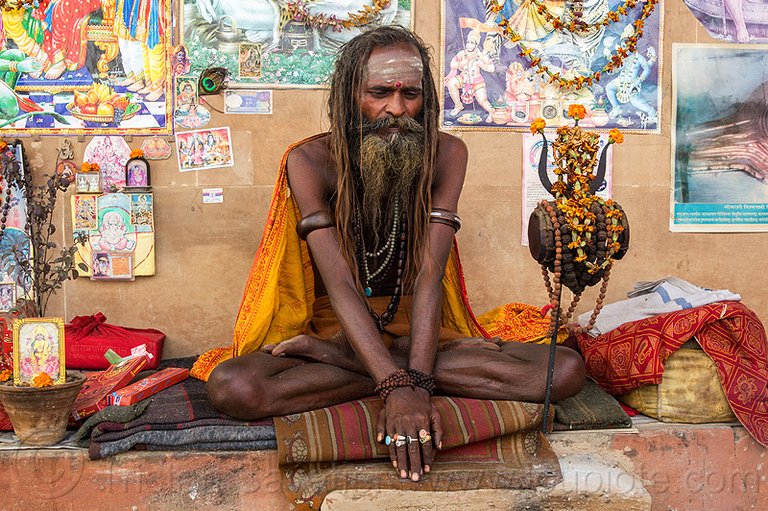
~ Definition - What does Sadhu mean? ~
A sadhu ( sādhu (male), sādhvī (female)), also spelled saddhu, is a religious ascetic, mendicant (monk) or any holy person in Hinduism and Jainism who has renounced the worldly life. They are decided to leave all material attachments and dedicate his life to achieving spiritual liberation, or moksha. Moksha, also called vimoksha, vimukti and mukti, is a term in Hinduism and Hindu philosophy which refers to various forms of emancipation, liberation, and release. There are between four and five million sadhus in Nepal and India today, living in the caves and woods and having no material possessions.
They were called "the silent ones" or the "the long haired ones" in ancient Vedic verses. In ancient times sadhuism was regarded as the highest form of religious life and the power of sadhu penance was such, it was said, that the gods unsuccessfully set down cosmic beauties to try to seduce them and generals laid down their arms rather than wage war against a city protects by a sadhus.
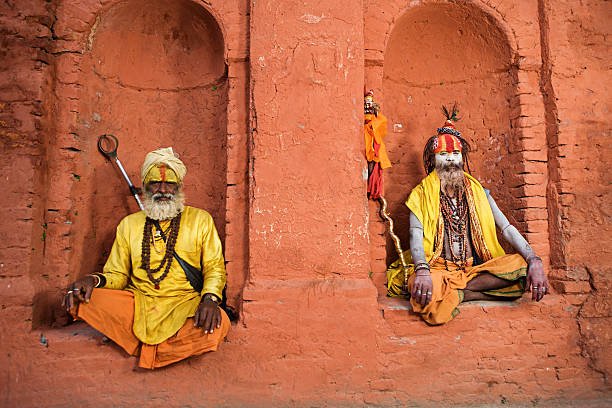
Hindus Sadhus and Buddhist monks have some similar customs. Both wander from place to place, surviving off alms and the goodness of others. In India it is a tradition for old men to leave their families and seek salvation. This is rooted in the Hindu belief in four stages of life: 1. Studentship; 2. Becoming a householder; 3. Retiring to the forest to meditate; and 4. Becoming a mendicant ( sannyasi ). Sannyasa (saṃnyāsa) is the life stage of renunciation within the Hindu philosophy of four age-based life stages known as ashramas. Sannyasa is traditionally conceptualized for men or women in late years of their life. During the third stage a man is expected to move into a hut in the forest with his wife and perform religious exercises. During the forth stage a man is expected to renounced all his worldly possession and become a beggar and devote himself totally to religion.
Some sadhus wander and travel a great deal. Others are more sedentary. Their religion duties include acts of self purification, worship, participation in religious discourses, making pilgrimages and studying religious texts. They also preach, teach religious doctrine, help the poor and troubled, and open schools and hospitals.
~ Clothes and markings ~
Sadhus are generally recognize by clothing color, symbols on specific parts of their body and possessions such as a rosary, water pot or staff. Sometimes body adornments are expressions of sadhus individuality and artisanship rather than symbols of a sect.
Some Hindu holy men wear saffron robes, holy beads and have a vermillion and ash spot on their forehead. Others wear only a loin cloth. Some wear only a loin cloth and a gold chain or a gold bracelet. Some wear nothing at all. Nagas are known for walking around completely naked.
Many sadhus follow rules in which they are allowed to grow hair in five areas: their head, their upper jaw, their chin, their armpits and their pubic areas. Some sadhus shave their entire bodies. Brahmin sadhus are identified by a sacred thread that runs diagonally from their left shoulder to their waist under their right arm.
During important festival sadhus cover their bodies with paint, sandalwood ash, and even sequins. On holy days some loin-cloth-clad sadhus wrap flowers around the top-knot in the their hair and smear their bodies with ashes. Sometimes their outfits can be quite elaborate. One mendicant was observed in a Mysore village with more than 100 different items on his body. It took him a couple of hours to dress and put on all his religious markers.
Some sadhus cover themselves with the ash of cremated bodies. Some tikkas are made from the ash of incense. Others place the mark of Vishnu on their brow or tattoo their forehead with mantras of Lord Rama and his wife Sita. In Pushkar, one journalist saw holy man with no arms or legs.
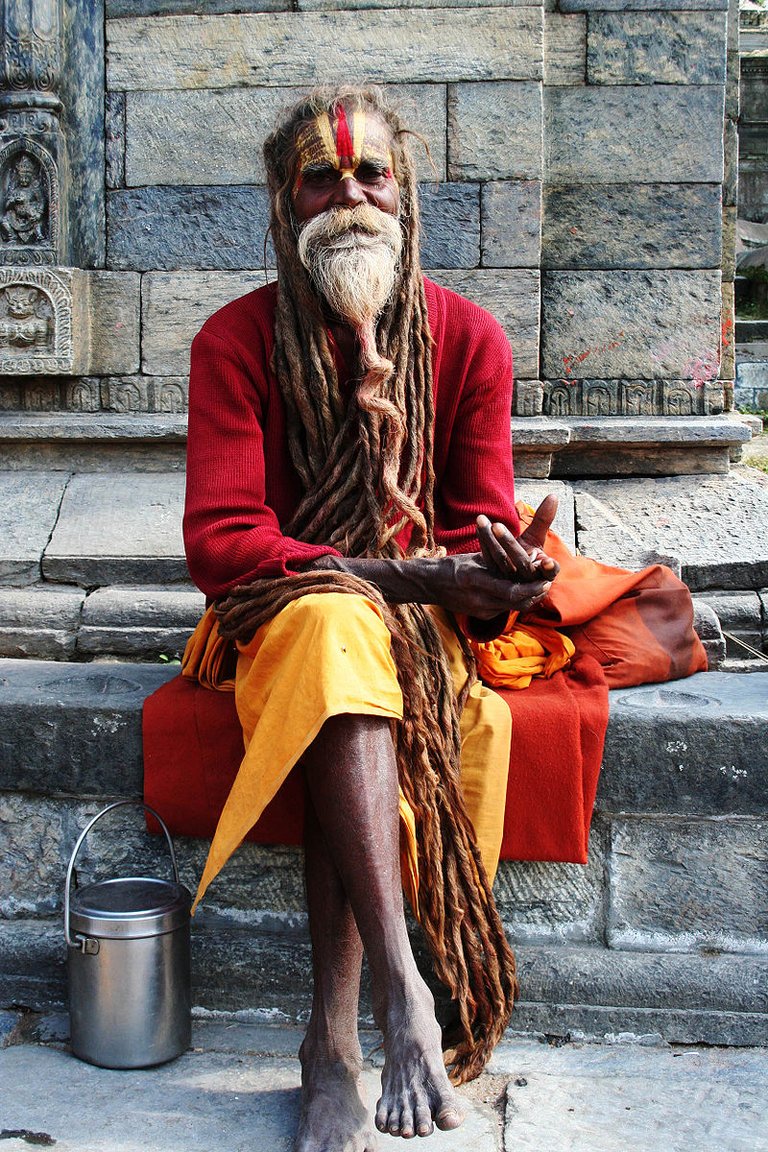
A Vaishnava sadhu in Kathmandu, with a Urdhva Pundra mark on his forehead.
~ Sadhu life ~
Sadhus generally are not part of any distinct community. They either live in monasteries (called ashrams , matha or mandira ), if they have chosen a sedentary lifestyle, or take up temporary residence in pilgrimage shrines, if they are on a pilgrimage. Each sects has its own monasteries and pilgrimage shrines.
The sadhu lifestyle places a premium on austerity, discipline and self-control. A sadhu's daily routine includes exercise intended to purify the physical body and elevate the mind, reading sacred verses, and attempting to reach levels of ecstasy through prayer. Generally, the only possessions owned by holy men are a wooden staff, an aluminum begging pot and a cloth bag slung around the neck with a few possessions, such as maybe a spoon, some scriptures and religious mementos. Holy men are supposed to beg only for food, discarding items given to them, saying "I never touch money. It buys only trouble. I would have to fight off thieves. Please, all I want is world peace."
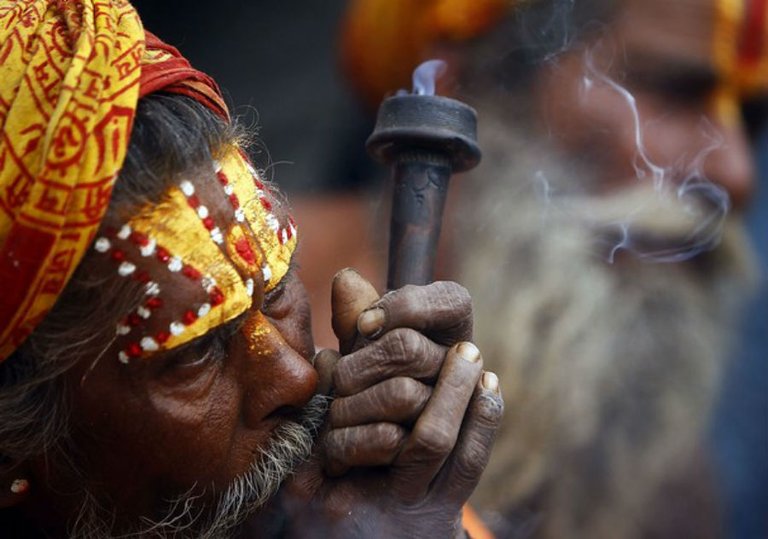
Sadhus are almost totally dependant on the generosity of others for their subsistence. Some supplement what they receive in alms from begging by serving as spiritual mentors, manufacturing amulets, tickling people with feather dusters, fortunetelling, performing exorcisms, singing, juggling, selling medicinal herbs, tattooing, interpreting dreams, reading palms, casting spells and making potions. Many make and sell talisman known as kavacga which are supposed to attract good spirits and repel evil ones.
Many sadhus smoke marijuana and hashish. Some sadhus sit in their huts and smoke hashish all day in water pipes. Others smoke chillums and joints full of hashish.
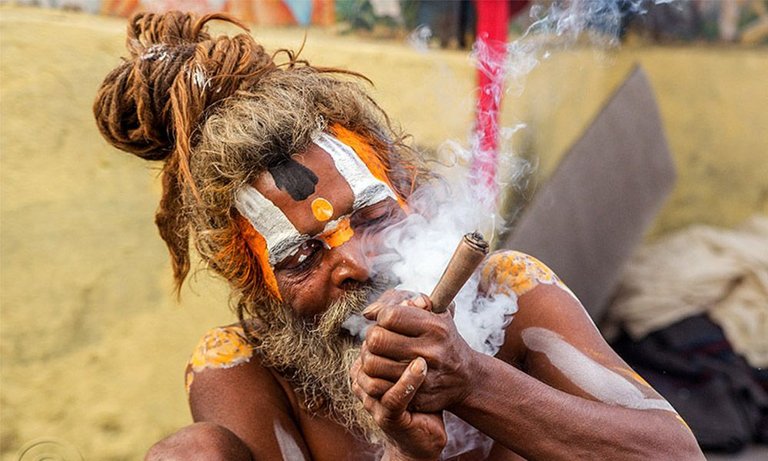
~ Sadhu Acts of Penitence ~
Hindu acetic do things like spend years with their left hand raised into the air, standing on one leg or lying on a bed of cactuses. Often have a blanket next to them to collect coins or food. Some bury themselves neck-deep in sand, pierce their tongues with spikes, stare at the sun, sleep standing up, mediate for hours while suspended from a rope, lay between fires, live in trees and refuse to talk for years. Hindus believed that severe penance will liberate them from the endless cycle of death and rebirth. Many of sadhus smoke marijuana or hashish to ease their suffering.
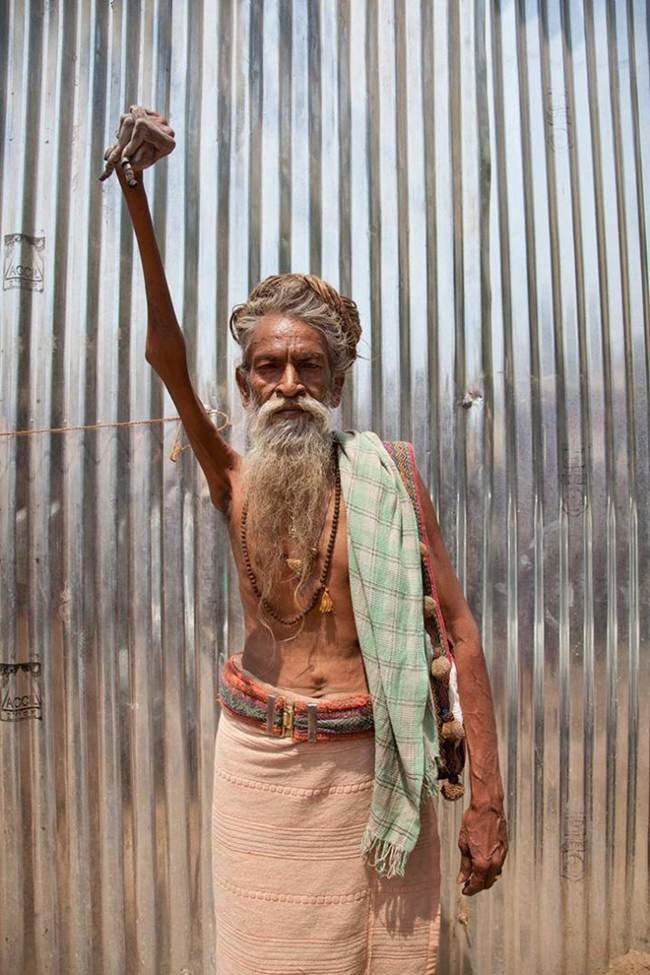
Sadhus sometimes bury their head, a feat of breath control that requires mastery of yoga techniques. In 1837, a yogi named Hari Das was buried alive without air, food, liquid or any attention, After being excavated he was easily revived and went on to live a long life.
One sadhu at the Pushkar Fair became famous for lifting a 35-kilogram brick with his penis. Some sadhus are said to have the ability to talk with monkeys. Sometimes they are sought out by people for help keeping monkeys from raiding their gardens.
According to the Guinness Book of Records, the silent Indian fakir Mastram Bapu stayed in the same spot by a road in the village of Chitra for 22 years, from 1960 to 1982. Swami Maujgiri Maharaja stood for 17 years (from 1955 to November 1973) performing Tapasya (penance) in Shahjahanpur, Uttar Pradesh. When sleeping, he leaned against a plank.
These are some facts and information about holy man from India. I hope you will like it and that you will enjoy reading it. =)
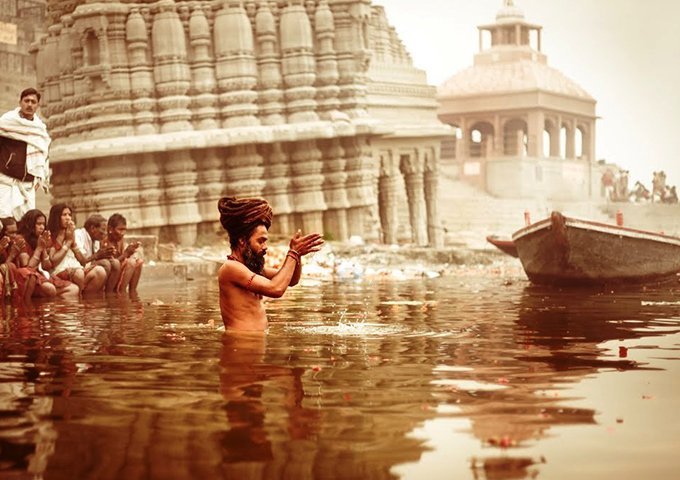
Congratulations @enii! You received a personal award!
You can view your badges on your Steem Board and compare to others on the Steem Ranking
Do not miss the last post from @steemitboard:
Vote for @Steemitboard as a witness to get one more award and increased upvotes!
Congratulations @enii! You received a personal award!
Click here to view your Board